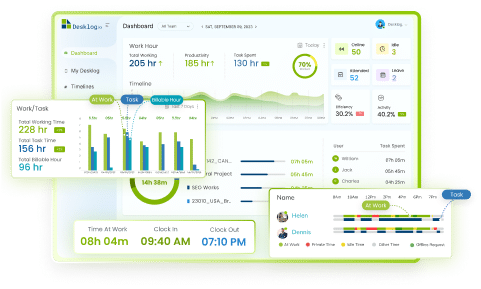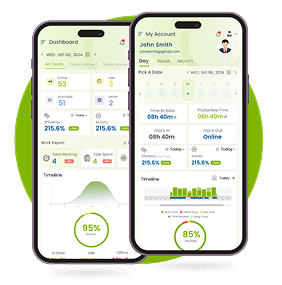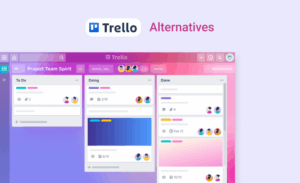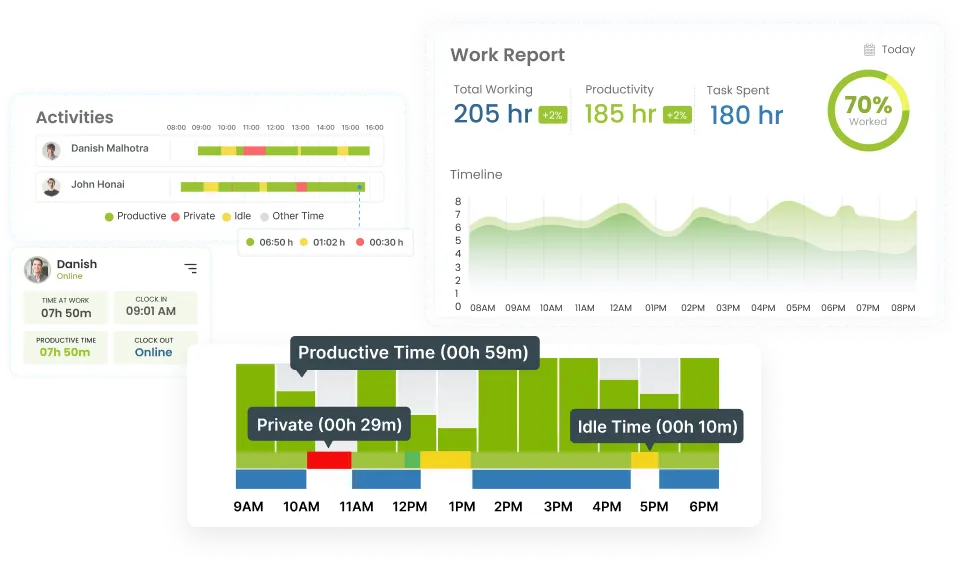For years, Trello has been widely recognized as a leading platform for Kanban-style project management. But as workplace demands evolve some teams are finding they need more than just task organization.
While Trello is excellent for visual task management, many users are now seeking time tracking software that offer built-in time tracking, detailed analytics, and automation that doesn't require stitching together multiple third-party apps. Whether you're managing remote teams, tracking billable hours, or simplifying HR workflows, it might be time to explore alternatives that align better with your growing demands.
In this blog, we’ll cover:
Why Teams Are Rethinking Trello in 2025
What to Look for in a Free Trello Alternative
Top 10 Trello Free Alternatives in 2025
Trello vs. Desklog: Side-by-Side Comparison Table
Who Should Switch to Desklog (and Why?)
Why Teams Are Rethinking Trello in 2025
As 2025 unfolds, organizations are reassessing whether Trello still fits their evolving collaboration and productivity needs. Several recent developments and user sentiments have prompted this shift:
Increasing Constraints on Free Plans
-
Stricter user limits: Trello introduced caps on the number of collaborators allowed in free workspaces, forcing many small teams and nonprofits to reconsider their reliance on the platform.
-
Rising frustrations: Affected users expressed dismay, saying the abrupt changes disrupted their minimal-cost workflows and forced them to hunt for alternatives.
Mounting Discontent Over Pricing Models
-
Costly workspace management: The pricing now treats every user as a full collaborator, significantly inflating costs even for modestly sized teams.
-
Limited value perception: Several users questioned the affordability and fairness of the pricing structure, particularly compared to other tools.
Feature Bloat and Usability Concerns
-
Loss of Kanban simplicity: Long-time fans argue that newer features like Gantt charts and intrusive checkmarks undermine Trello’s core strength: clean, visual task management.
-
Mobile shortcomings: Users find the mobile experience lacking, with missing power-ups and inconvenient navigation, limiting on-the-go usability.
Delayed Feature Improvements and Limited Support
-
Ongoing frustrations: Users express disappointment over the slow pace of improvements and the lack of support for free plan users.
-
Support shifted to paid tiers: As of June 2024, only paid subscribers can open help tickets, leaving free plan users dependent on community forums.
Shift Toward Personal Productivity Tools
-
Repositioning priorities: With updates like Trello Inbox and Trello Planner launching in early 2025, Atlassian is pivoting toward being a personal to‑do and time-management app.
-
Enterprise messaging: Official communications emphasize that Trello is no longer ideal for team project management and Jira is being positioned as the better alternative for complexity and collaboration needs.
What to Look for in a Trello Free Alternative
As more teams begin exploring alternatives to Trello’s free plan, it's important to evaluate what features truly support productivity, collaboration and long-term scalability especially if you're looking to manage both tasks and time effectively without stretching your budget.
Here are the key capabilities to consider when choosing a free alternative to Trello:
- Integrated Time Tracking Beyond task boards, the best alternatives provide built-in time tracking tools that let you track how long tasks take without relying on third-party apps.
- Task Management with Automation A good Trello alternative should support more than just manual task creation. Look for tools that offer recurring task automation, due date reminders, and status updates that minimize repetitive admin work.
- Productivity Tracking & Analytics For managers and team leads, visibility is key. A platform that includes activity tracking, idle time tracking, and real-time productivity data can provide insights to help guide decisions and ensure accountability.
- User Access and Cost Scalability Many users switch from Trello due to limited free-tier collaboration. A valuable alternative should offer generous user limits or workspace options even in the free version so you can grow your team without incurring steep costs early on.
Top 10 Trello Free Alternatives in 2025
- 1.Desklog
- 2.Clickup
- 3.Wrike
- 4.Monday
- 5.Asana
- 6.Jira
- 7.Teamwork
- 8.Paymo
- 9.Todoist
- 10.Airtable
| Rank | Tool | Best For | Notable Free Features | Task Management | Time Tracking | Automation |
|---|---|---|---|---|---|---|
| 1. | Desklog | Teams seeking automated time and project tracking | Unlimited Users, Advanced Time Tracking, Unlimited Projects, Automated Timesheet, Project Time Tracking, Wellness Reminders. | ✅ Yes | ✅ Yes | ✅ Yes |
| 2. | Clickup | All-in-one team productivity | Unlimited Tasks,Kanban Boards,Calendar View,In-App Video Recording,24/7 Support. | ✅ Yes | ✅ Yes | ✅ Yes |
| 3. | Wrike | Project management for mid-to-large teams | Multi-language support,Task management,Subtask management,Custom work views | ✅ Yes | ✅ Yes | ✅ Yes |
| 4. | Monday | Visual task workflows & collaboration | Unlimited docs,200+ templates,8 column types,iOS and Android apps, Kanban view | ✅ Yes | ❌ No | ✅ Yes |
| 5. | Asana | Simple project tracking for small teams | Unlimited tasks, Unlimited projects, Activity logs, List, board, and calendar views | ✅ Yes | ❌ No | ✅ Yes |
| 6. | Jira | Agile teams & software development | Unlimited projects and tasks, Timeline View, Calendar View and Summary View,Reports and dashboards | ✅ Yes | ❌ No | |
| 7. | Teamwork | Client services & billable work | Time tracking,Timesheets, Project views, Task essentials, Dashboards | ✅ Yes | ✅ Yes | ✅ Yes |
| 8. | Paymo | Freelancers & agencies | Unlimited Users, Unlimited Time Tracking, Unlimited Invoices,Task List View,Desktop & Mobile Apps | ✅ Yes | ✅ Yes | ✅ Yes |
| 9. | Todoist | Personal task management | Smart quick add,Task reminders,Flexible list & board layouts | ✅ Yes | ❌ No | ✅ Yes |
| 10. | Airtable | Database-style project planning | Task Visualization,AI Field Agents,AI Admin Controls | ✅ Yes | ❌ No | ✅ Yes |
Desklog – A True Free Alternative to Trello
Best For:
Teams and businesses seeking automated time,productivity, and project tracking with easy setup, insightful reporting, and a cost-effective (often free) solution.
Overview:
Desklog is a time and productivity tracking software designed for modern teams. It automates key workflows and provides complete visibility into how time is spent across tasks and projects. The platform supports unlimited users and projects under its generous free plan, making it the best Trello alternative, perfect for startups, remote teams, HR departments and any organization that prioritizes accountability and efficiency.
While Trello is widely known for its simple, visual task management through Kanban boards, its free plan comes with significant limitations. In contrast, Desklog offers so many premium features in its free version. Teams can track productive, idle, and offline hours automatically, generate detailed timesheets, log time directly via a web timer, and manage project timelines. This makes Desklog a much more complete solution, especially for teams that need to track time and performance as much as they need to manage tasks.
Key Features:
- Automated Time Tracking: Logs login/logout, productive, idle and offline hours with no manual entries needed.
- Project & Task Tracking with Kanban Track tasks and projects visually with workflow boards and task tracking.
- App & URL Tracking Tracks application usage and visited websites to highlight productivity and distractions.
- Optional Screenshot Capture For added accountability, screenshots can be scheduled and taken automatically.
- Automated Reports & Timesheets Generate project timesheets, billing information, etc. exportable in formats like CSV/Excel.
- Offline Time Tracking & Web Timer Works even without internet access by caching data; plus, a web timer is available for instant logging.
- Leave and Shift Management Supports leave requests, attendance tracking and shift scheduling directly within the platform.
- Project Billing and Invoicing Bill clients accurately using hourly rates, flat fees, or user-specific rates, perfect for flexible, client-ready invoicing.
Pros:
- Highly user-friendly, with quick onboarding and simple dashboards.
- Generous free plan offering unlimited users, tasks, and projects.
- Affordable upgrades, with business and enterprise plans starting at around $3.50/month.
- Strong customer support, frequently mentioned in user reviews.
Cons:
- Initial setup learning curve noted by a few users.
Pricing:
- Free Plan: $0/month
- Business Plan: $3.50 per user/month
- Enterprise Plan: $4.80 per user/month
Trello vs Desklog Comparison Table
Below is a side-by-side comparison of the features offered in Desklog’s free plan versus Trello’s, highlighting why Desklog stands out as one of the best free Trello alternatives available today.
| Feature | Trello Free | Desklog Free |
|---|---|---|
| Time Tracking | ❌ | ✅ |
| Unlimited Users | ❌ | ✅ |
| Unlimited Projects / Boards | ❌ | ✅ |
| Offline Time Tracking | ❌ | ✅ |
| Web Timer | ❌ | ✅ |
| Timesheet Generation | ❌ | ✅ |
| Clock In/Clock Out | ❌ | ✅ |
| Task Timeline | ❌ | ✅ |
Clickup
Best For:
Teams or individuals looking for a deeply customizable and feature-rich project management platform with collaboration tools.
Overview:
ClickUp is a powerful all-in-one productivity platform designed to centralize task management, collaboration, and documentation within a single tool. Unlike Trello, which favors simplicity and a kanban-only view, ClickUp provides a complex but highly adaptable structure with multiple views, deep task hierarchies, and customizable features that suit a variety of workflows, from agile software development to content planning and beyond.
Key Features:
- Unlimited Tasks & Users: Even on the free plan.
- Hierarchical Structure: Spaces, folders, lists, tasks, and subtasks for deep project organization.
- Real-time Collaboration: Docs, whiteboards, chat, and comments with live editing.
- AI Assistant: Role-specific AI productivity tools.
- Time Tracking & Sprints: Built-in tools for agile and time-sensitive work.
- Integrations: Compatible with popular tools and apps.
Pros:
- Highly customizable to fit any workflow or team structure.
- Multiple project views beyond just kanban.
- Good documentation and help resources.
- Free plan with generous limits.
Cons:
- Steep learning curve due to complexity and number of features.
- Slow and sometimes laggy interface.
- Overwhelming UI for beginners or simple projects.
Pricing:
- Free Plan: $0/month
- Unlimited: $10/month
- Business: $19/month
- Enterprise: Customizable
Wrike
Best For:
Organizations seeking a feature-rich work management platform that excels in visualization, automation and cross-team collaboration.
Overview:
Wrike is a cloud-based project and work management platform with extensive tools for task planning, visual project tracking, and real-time teamwork. Unlike simpler apps, Wrike emphasizes powerful features such as interactive Gantt charts, resource and time tracking, and a variety of visual task layouts (board, table, calendar) to suit diverse workflows.
Key Features:
- Automations & Workflow: Task automation anywhere from 50 to 200 actions/month (depending on plan)
- Resource & Time Tracking: Available in Business and higher plans; monitor workload, capacity, hours, and budgets.
- Dashboards & Reporting: Custom dashboard views and real-time reporting tools, especially in higher tiers.
- Integrations: Over 400 apps including Google Drive, Salesforce, Adobe CC, Slack; plus an open API for custom integrations.
- Mobile & Offline Support: Web, desktop, mobile apps available.
Pros:
- Feature‑rich and suitable for complex, growing workflows.
- Strong reporting and resource management for team oversight.
- Customizable dashboards and automated workflows save time.
- Secure and enterprise-ready with higher-tier plan features.
Cons:
- The array of features can be overwhelming for new users.
- Time tracking tools may feel basic or cumbersome for day-to-day users.
- Higher pricing, especially for advanced functionalities.
Pricing:
- Free: $0/ user/ month
- Team: $10 / user/ month
- Business: $25/ user/ month
- Enterprise: Custom quote
- Pinnacle: Custom quote
Monday.com
Best For:
Monday.com is best for teams that need a highly customizable, visual project management tool with a focus on workload planning and real-time data dashboards.
Overview:
Monday.com is a versatile project management platform designed for teams that value visual organization and flexibility. It offers multiple project views allowing users to manage projects the way that best suits their workflow. Unlike Trello’s simple boards, monday.com provides customizable columns, filters, and dashboards that let you visualize team progress and metrics at a glance.
Key Features:
- Multiple Project Views: Kanban, calendar, timeline, workload, file, and form views
- Visual Dashboards: Customizable dashboards that pull data from multiple boards
- Time Tracking: Built-in time tracking for each task
- Automations: Trigger task updates, notifications, or status changes based on conditions
Pros:
- Highly customizable boards and dashboards
- Built-in time tracking without the need for add-ons
- Strong automation and integration options
Cons:
- Steeper learning curve for new users
- Advanced features (like dashboards and timeline views) are limited to premium plans
- Customization requires manual setup and fine-tuning
Pricing:
- Free: $0
- Basic: $9/user/month
- Standard: $12/user/month
- Pro: $19/user/month
- Enterprise: Custom pricing
Asana
Best For:
Larger teams seeking advanced project templates, flexible views and advanced workflow automation.
Overview:
Asana is a powerful project management tool designed to help teams and individuals break down complex projects into manageable tasks. With a clean, user-friendly interface, users can easily create, assign, and track tasks in formats like lists, boards, calendars, and timelines. Asana also provides a rich template library, built-in automation workflows, and advanced customization through features like custom fields and AI-powered task queries.
Key Features:
- Multiple project views: List, Board, Calendar, Timeline
- Built-in task assignment, dependencies, and recurring tasks
- Advanced reporting with custom fields
- Zero-code Workflow Builder for automation
Pros:
- Easy to use with intuitive UI
- Powerful workflow automation
- Extensive templates and customization
- Strong mobile app support
Cons:
- Premium plans are relatively expensive
- Some collaboration/storage limits in lower tiers
Pricing:
- Free: $0
- Starter: $13.49/user/month
- Advanced: $30.49/user/month
- Enterprise: Contact sales for pricing
Jira
Best For:
Jira is best for Agile software development teams, particularly those using Scrum or Kanban methodologies.
Overview:
Jira, developed by Atlassian (the same company behind Trello), is a purpose-built project management tool designed specifically for software development teams. It supports both Kanban and Scrum boards and includes powerful Agile project features such as backlog management, sprint planning, and velocity tracking. Unlike general-purpose tools like Trello, Jira’s interface, templates, and workflows are optimized for dev teams working within structured methodologies.
Key Features:
- Agile Boards: Kanban and Scrum support with sprint planning and backlog management
- Advanced Issue Tracking: Track bugs, features, and technical tasks with customizable workflows
- AI Features: Suggested subtasks, smart search filters, comment summaries, and prompt-based automation
- Custom Workflows: Tailor project templates and processes to your team’s needs
Pros:
- Powerful issue tracking and backlog organization
- AI-driven features for task management
- Integration with popular dev tools
- Strong sprint planning and team progress tracking
Cons:
- Limited free plan (restrictions on users and features)
- Not ideal for non-technical or general task management
Pricing:
- Free: Up to 10 users, basic features
- Standard: $8.60/user/month
- Premium: $17/user/month
- Enterprise: Custom pricing
Teamwork
Best For:
Agencies and client-service teams needing built-in time tracking, budgeting, and invoicing within a collaborative project management platform.
Overview:
Teamwork.com is a project management platform purpose-built for agencies and client-focused businesses. Unlike general-purpose tools like Trello, Teamwork integrates advanced features like time tracking, budgeting, invoicing, and resource management, making it ideal for tracking billable work, managing client relationships, and keeping project financials on track. Its structured environment supports unlimited users, tasks, and projects even on the free plan, and gives teams several ways to view and manage work.
Key Features:
- Built-in Time Tracking: Track time spent on tasks and projects directly in the platform.
- Budgeting & Invoicing: Set budgets per project and convert tracked time into client invoices.
- Resource Management: Monitor workloads and allocate team capacity effectively.
- Subtasks & Dependencies: Add layers of detail and control task sequencing.
Pros:
- Designed for team collaboration with built-in messaging, comments, and document editing.
- Resource and workload management features improve planning.
- Unlimited users and projects on all plans, including free.
- Client access features enable transparency without oversharing.
Cons:
- More complex and slower to set up compared to lighter tools
- Limited custom field types restrict task personalization.
- Starter plan is more expensive than similar tools.
Pricing:
- Free Plan: $0/month
- Deliver Plan: $13.99/user/month
- Grow Plan: $25.99/user/month
- Scale Plan: Custom pricing
Paymo
Best For:
Paymo is best for freelancers, small agencies, and service-based businesses that need an all-in-one platform for time tracking, invoicing, and project management.
Overview:
Paymo is a work management platform designed to help teams and individuals manage tasks, track time and handle invoicing from a single app. With a clean interface and generous free plan, Paymo simplifies everyday project workflows while supporting detailed reporting and financial tracking. Features like guest access for clients, visual workload planning, and Zapier integrations make it easy to collaborate and automate routine tasks.
Key Features:
- Automatic Time Tracking: Track time with built-in timers or use manual/bulk editing for flexibility.
- Invoicing & Expense Tracking: Create invoices directly from tracked time or expenses.
- Task Management: Organize tasks by project, assign users, and set priorities or deadlines.
- Cross-Platform Support: Available on Windows, macOS, Linux, Android, and iOS.
Pros:
- All-in-one tool for time tracking, invoicing, and task management
- Clean, intuitive UI makes it easy to navigate and use
- Generous free plan includes unlimited tasks, users, and time tracking
Cons:
- Task setup and project scoping can feel complex for beginners
- Higher pricing may not scale well for larger teams
Pricing:
- Free: $0
- Starter: $5.9/ user / month
- Small Office: $10.9/user/month
- Business: $16.9/user/month
Todoist
Best For:
Todoist is best for individuals, freelancers, and small teams who need a clean, fast, and intuitive task management tool.
Overview:
Todoist is a user-friendly task management app focused on helping users stay organized through features like natural language processing (NLP), nested subtasks, and productivity tracking. It’s not designed for complex project collaboration, but it excels in personal productivity. Features like Google Calendar sync, cross-device access, and Karma points help users stay on track. With 60+ integrations and Zapier support, Todoist can easily fit into a broader productivity system.
Key Features:
- Nested Subtasks & Projects: Organize complex tasks within categories and projects
- Karma Points: Earn productivity points as you complete tasks
- Cross-Platform Sync: Access tasks from desktop, mobile, browser, and smartwatches
- Google Calendar Sync: Real-time two-way calendar integration
Pros:
- Simple, intuitive interface
- Excellent for task and subtask management
- Great for personal organization and habit-building
Cons:
- Lacks collaboration and project planning features
- No visual views like boards or timelines
- Limited reporting or team management functionality
Pricing:
- Beginner: Free at $0
- Pro: $2/user/month
- Business: $6/user/month
Airtable
Best For:
Airtable is best for teams that need a powerful, flexible tool for organizing large sets of data and managing complex workflows.
Overview:
Airtable is a hybrid between a spreadsheet and a database, designed to handle complex projects with ease. It allows users to store and organize different types of data across customizable records and fields. Compared to tools like Trello, Airtable offers far more customization and power. Views like grid, calendar, gallery, Kanban, Gantt, and timeline allow users to manipulate and digest their data however they prefer.
Key Features:
- 30+ Field Types: Store data like checkboxes, attachments, URLs, long text, barcodes, and more
- Custom Interfaces: Build dashboards and user views with charts, buttons, filters, and forms
- Advanced Filtering/Sorting: Customize how you see and interact with data
- Templates: Start quickly with pre-built templates for project tracking, marketing, HR, and more
Pros:
- Extremely customizable for advanced workflows
- Helpful templates make setup easier for common use cases
- Great for collaboration across teams and departments
Cons:
- Complex setup process
- Might be overkill for simple task tracking or small projects
- Some advanced features are only available on paid tiers
Pricing:
- Free: $0
- Team: $24 per seat/month
- Business: $54/seat/month
- Enterprise: Custom pricing
Who Should Switch to Desklog (and Why?)
Startups Who Need More Than Just Task Lists
Trello is great for organizing tasks, but startups often need time tracking, productivity insights, and project profitability tracking, all in one tool.
Desklog offers:
- Automated time tracking
- Project-wise time and cost analysis
- Unlimited users and projects (even on the free plan)
Why Switch?
Startups can manage productivity, track real-time workload, and stay on budget, all without paying for multiple tools.
HR Teams Managing Workflows and New Hires
Human Resources needs more than Kanban boards. They need clarity on attendance, engagement, and daily work behavior.
Desklog helps HRs:
- Track login/logout times (Clock-in/Clock-out)
- Track idle time and productive hours
- Generate automated timesheets for payroll
- Onboard and manage new team members
Why Switch?
Desklog turns time data into HR insights without requiring extra HR software.
Remote Teams Needing Transparency and Accountability
Remote work demands visibility, trust, and proof of productivity, especially across time zones.
Desklog supports remote teams with:
- Real-time user timelines
- App & URL tracking
- Offline time tracking and screenshots (optional)
- Attendance and activity tracking
Why Switch?
Desklog brings transparency without micromanagement, ideal for asynchronous and remote-first work cultures.
Project Managers Tracking Time and Deliverables
Project Managers need more than task boards. They need data to keep teams on track and budgets under control.
With Desklog, PMs can:
- Assign tasks and track completion in real time
- Track actual time spent vs. estimated time
- Analyze task timelines and user contributions
- Generate project-wise reports and profitability insights
Why Switch?
Desklog empowers PMs with data-backed decisions, not just task completion status.
Conclusion
After comparing a wide range of project management tools from ClickUp and Asana to Jira and Airtable, it’s clear that while many platforms offer great features, few deliver the depth of functionality that Desklog provides for free.
Trello remains a popular option for visual task organization, but as team needs evolve, its limitations become increasingly noticeable. Here is where Desklog stands out by offering an all-in-one solution that combines project management, automated time tracking, productivity tracking, and much more. In a crowded field of alternatives, Desklog is undoubtedly the smarter, more complete replacement for Trello.
FAQ
1 Why is Desklog considered a better Trello alternative than the free version of Trello?
Desklog offers automatic time tracking, offline support, web timers, timesheet generation, and more—all included in its free plan—features Trello locks behind paid tiers or requires third-party integrations to replicate.
2 What’s the best free Trello alternative with built-in time tracking?
Desklog is the top choice—it offers integrated time tracking, detailed reports, and Kanban-style project boards completely free.
3 Is Trello still a good option in 2025?
Trello still works well for basic task management, but many growing teams are switching to alternatives like Desklog that offer more advanced features for free.
4 Do these Trello alternatives offer mobile apps?
Yes, most popular Trello alternatives—including Desklog—have dedicated mobile apps for both iOS and Android, ensuring on-the-go access.
5 Is Desklog a free Trello alternative that supports unlimited users and projects?
Yes! Desklog’s free plan supports unlimited users and projects, while Trello's free tier limits users and caps boards per workspace—so Desklog scales better for growing teams.
6 What’s the best Trello alternative for offline and hybrid work environments?
Desklog includes offline time tracking and a browser-based web timer, features not available in Trello’s free plan, ensuring consistent tracking even without internet access.
7 Is Desklog the best Trello alternative for remote-first teams?
Absolutely. With capabilities like app & URL tracking, optional screenshots, real-time timelines, and attendance data, Desklog delivers transparency and accountability—something Trello’s free plan lacks.

















